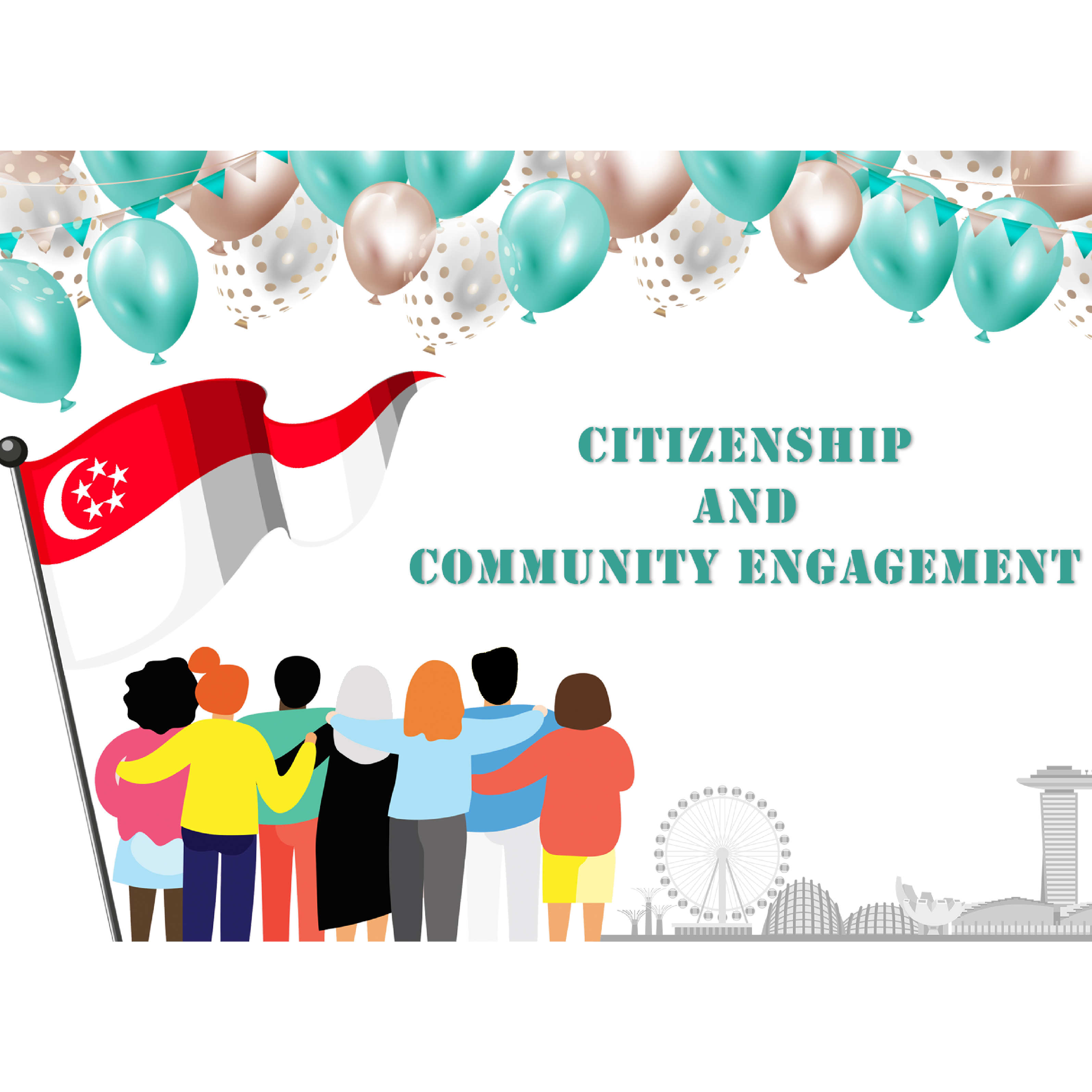
Enabling and enfranchising young people as citizens is one of the oldest aims of education. In a world where engagement and commitment are much needed, a civic-focused education can give students dispositions and tools to be more effective participants in their society. Here in Raffles Institution (RI), the notions of ‘citizenship’ and ‘community engagement’ are part of the core and co-curricula.
Enrichment programmes such as Governance and Civic Engagement and co-curricular groups such as Raffles Interact and Entrepreneur’s Network, all provide opportunities for our students to explore and engage in civic and community engagement. The faculty members bring their different disciplinary understandings in thinking about why it is important to prepare students for lives of community and civic engagement, and what exactly this demands of their programme design and student participation. Faculty members’ own histories, passions, and interests in building a better society have inspired them to consider how they may act on that commitment in the classroom, and how they may encourage and enfranchise students to be more compassionate, informed, and active as citizens.
1. Governance and Civic Engagement (Enrichment Programme)
GCEP, an optional Enrichment Programme for Y5 students, aims to nurture active and socially responsible citizens by equipping them with relevant knowledge and critical skills so that they can participate and contribute to society effectively. Through weekly sessions in Terms 2 and 3, student participants discuss and debate issues related to citizenship, society, government, and politics. The GCEP classroom encourages students to have frank conversations, sharing their thoughts and opinions in an open and safe environment. Students are taught how to build on, extend, and challenge each other’s ideas in a collaborative and engaging manner.

During the virtual tour on zoom, the mayor’s staff invited a professional artist to teach the students how to make cheongsachorong – traditional Korean lanterns (From Raffles Press)
The programme also comprises an attachment to a Member of Parliament during his/her Meet-the-People sessions (MPS), an important link between the government and the people. This helps to instil greater civic consciousness as participants become more aware of the problems and issues faced by ordinary Singaporeans. A crucial reflection needed of students during their MPS attachment is on the ‘how’s and ‘why’s of the disparity between policy intentions and the impact and outcomes on the ground.
2. International Service-Learning & Leadership Elective (Enrichment Programme)
An important question undergirds ISLE’s curriculum: What are we called to do?
A multicultural education and service learning are both necessary for empowering students to better understand the world and have a positive impact on society. Keeping abreast of current affairs and the many urgent and pressing problems of our time draw attention to issues of inequity and injustice in the world, but at the same time, this can also leave students feeling overwhelmed and powerless. Service-learning is the action component for those feelings, providing opportunities to address injustice.
ISLE is a service-learning and leadership programme that aims to develop young people to be effective leaders of character with relevant skills to be community leaders and competent global citizens who are confident and sensitive in their interactions with people from different cultures. The ISLE teacher-mentors have designed a learning strategy in which students have leadership roles in thoughtfully organised service experiences that meet real needs in the community through an asset-based community development focus. The service is integrated into the students’ service-learning studies with structured time to research, reflect, discuss, and connect their experiences to their learning and worldview. Additionally, talks by community leaders, discussions on case-studies, and asset-mapping exercises have enabled and empowered students to develop a deeper awareness of themselves, of others, and of broader social issues, and to see their potential to effect change.
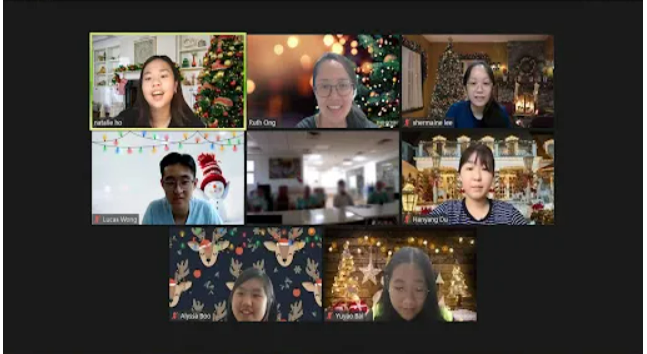
Christmas themed session with the elderly at Ren Ci in December 2021 (From Raffles Press)
3. Global Studies Programme: The Neo-Generalist (Enrichment Programme)
GSP focuses on developing its student participants into the budding Renaissance person or the Neo-Generalist, someone who can not only talk a little about everything but who is also absolutely interested in a range of ideas and topics. GSP’s “How to Talk About” series aims to engage and optimise the power of diverse experience, breadth, and interdisciplinary exploration through topics like culture wars, urban planning, film criticism, literature, history, international relations and conflict, race and religion, and architecture.
Beyond the sheer intellectual range that the students are exposed to, they also learn how to hone their orientation towards others by considering multiple perspectives and competing values and interests in society. Through an exposure to different industry practitioners and experts, students learn how to understand conflicts, complements, and connections between seemingly disparate entities. Sessions are then designed for students to gain an understanding of topics in relation to themselves and the larger society, and to explore what it means to build a just city, not just a global competitive city.
Given that the design of the programme is guided by the idea that effective global action is ultimately rooted in the local, two important questions inform the students’ reflections over the course of the programme:
- What would a just city look like and what could be the strategies to get there?
- Would we design better places if we put the values of equality, inclusion and equity first?
4. Raffles Interact (CCA)
Service is at the core of Interact’s programme. The CCA is guided by a clear framework integrating values and meaningful relationships throughout the Interact curriculum. The principles of life and dignity of the human person, community and participation, and options for the vulnerable amongst others all go towards informing the students’ experience in the CCA.
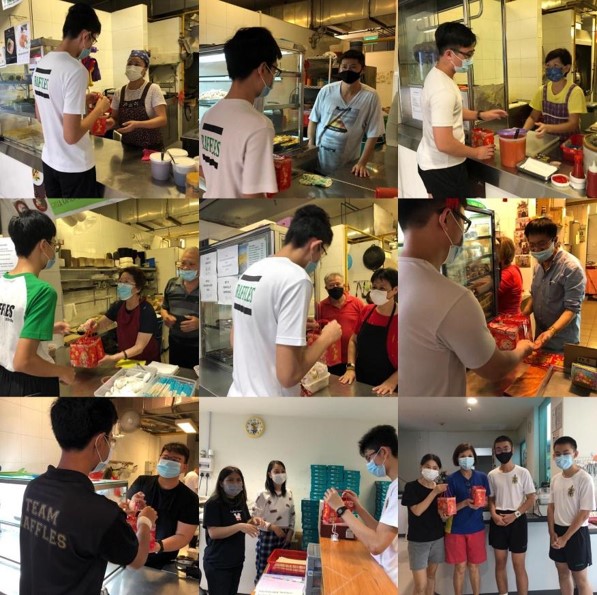
In 2021, Year 1 to 4 students from the Interact Club have come together during this festive season to organise a “Spring Giving” event to appreciate our non-teaching staff for their hard work.
Interactors’ engagement in community service with groups like the Singapore Disability Sports Council and St Luke’s Eldercare (Residence@AMK), has provided young people with opportunities to connect with caring adults and peers in making a difference in their communities. Through community service, Interactors develop personal, civic, social, and academic skills that go beyond their time in RI. Through interaction with persons of different age groups, races, and cultures, Interactors not only gain skills for effective communication, they also gain an understanding of persons who are different from themselves. By working alongside adults in different service activities, these young people are also exposed to different career opportunities.
While Interactors gain from their experiences, they, like the ISLE students, are urged to reflect if the community gains from their service. Both groups are consciously encouraged to see their outreach to the community as a symmetrical relationship, where students have much to learn from the communities they serve.
5. Raffles Entrepreneur’s Network (REN)’s Seniors Go Digital initiative
In December 2020, members of the Raffles Entrepreneur’s Network (REN) partnered with the Infocomm Media Development Authority (IMDA) to facilitate two “Seniors Go Digital” events. REN’s members provided personalised, individual assistance to seniors who wanted to learn how to use their phones. The seniors at the two digital clinics in Tampines and Raffles Place were attendants and cleaners working in the vicinity. Many of them were unfamiliar with even the basic functions of their phones. REN members guided these seniors in accessing government digital services and in the operation of basic communication tools like messaging and video calling. Through these sessions, REN members were able to observe the difficulties the less tech-savvy faced in responding to the digital demands of our Smart Nation. And yet, they also understood how this offered a chance for seniors in society to learn new skills which could go a long way in facilitating communication, especially between the tech-savvy and the not-so-tech savvy.
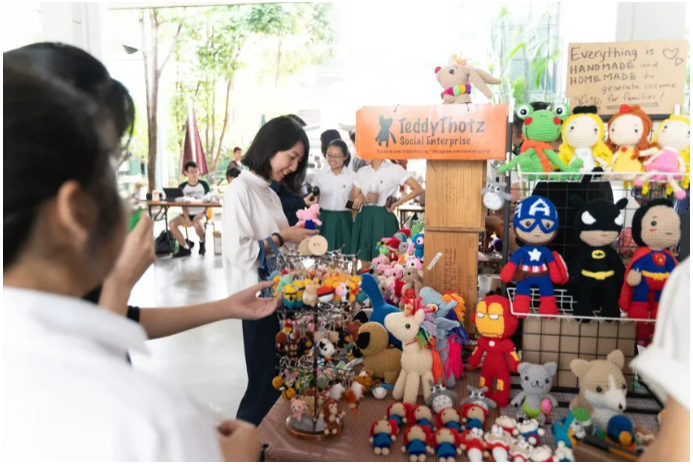
Entreweek 2019 (From Raffles Press)
6. National Education
The NE programme in RI leads with three important questions:
- What are the common grounds and values of and between Singaporeans and our public institutions?
- What is civic agency and how do we build it in society?
- How do we balance individual and collective interests in a country as diverse as Singapore?
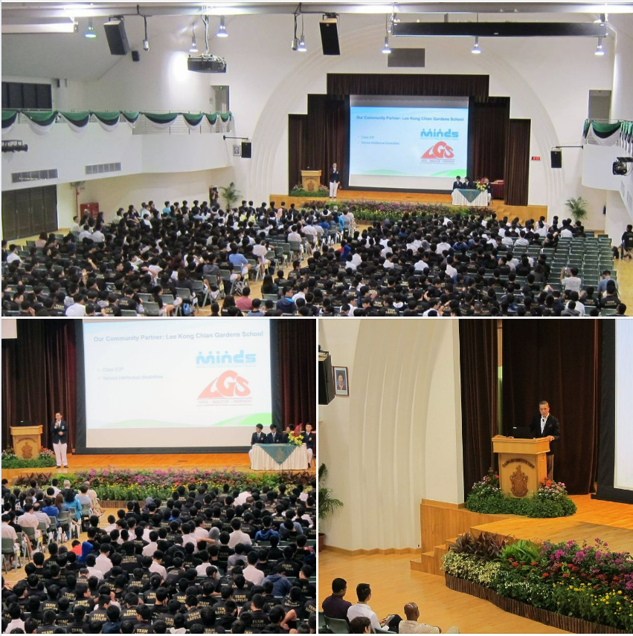
In 2016, Research Education Congress, featuring the research findings of our students and their peers from other schools
National Education in RI uses a two-pronged approach to engage students on principles in and issues of citizenship education. The NE committee effectively uses both year-long programmes and theme-specific events to work with students at their preferred level of engagement so as to better use these platforms and events to translate the abstract principles involved in citizenship education into tangible and observable traits at the individual and community level. Through the NE programme, students in Y5-6 examine important questions on identity, choices, and relationships.
As the snippets of the programmes and CCAs above show, there is clear emphasis on engaging students as citizens of the RI community right now, as well as preparing them for future lives of national and global citizenship. At RI, we believe that it is important for our students to know and understand the power that one individual can have in making an impact; the power that one good idea can have in transforming communities; and the power of many coming together to create a society that is liveable for all.
(Photographs credits: Raffles Press, RPAC and RPS)
